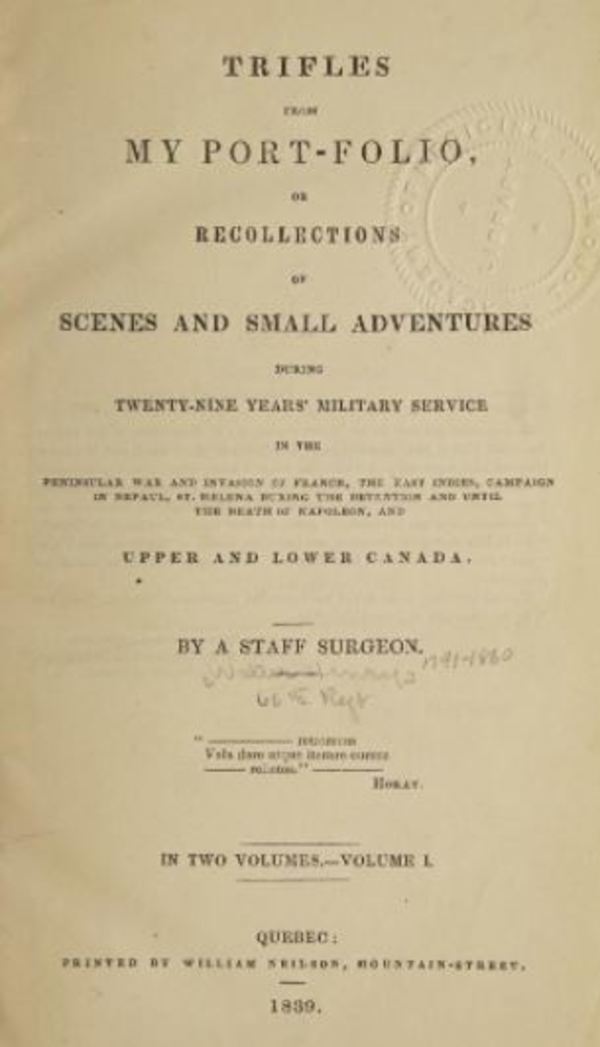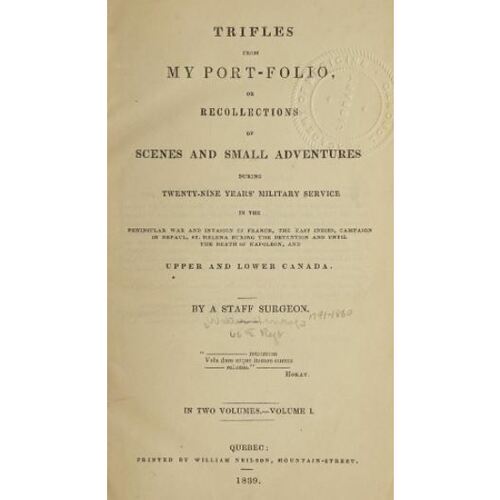
Source: Link
HENRY, WALTER, army officer, surgeon, author, and sportsman; b. 1 Jan. 1791 in Donegal (Republic of Ireland), first son of John Henry, merchant; m. first 6 April 1831, in Montreal, Charlotte Todd (d. 1833); m. secondly 2 July 1834 Leah Allan Geddes in Kingston, Upper Canada, and they had four sons and two daughters; d. 27 June 1860 in Belleville, Upper Canada.
Walter Henry was born of what he described as a “respectable” family. An avid reader, he received a classical education and, possibly influenced by his uncle, a Donegal physician, he pursued medicine at Trinity College, Dublin, at the University of Glasgow, and at hospitals in London. Upon completing his studies in 1811, Henry passed the regimental surgeon’s examination set by the Royal College of Surgeons of London and he immediately entered the army as a hospital mate on general service. In December 1811 he became an assistant surgeon in the 66th Foot, with which he served throughout the Peninsular War, participating in numerous actions including Badajoz, Vitoria, and Nivelle. Henry was posted to India and Nepal in 1815 with the regiment’s first battalion, which was recalled in 1817 to join the second battalion in garrisoning the south Atlantic island of St Helena, where Napoleon was confined. He found the former French emperor “unsightly and obese”; in 1821 he kept the official notes made during Napoleon’s autopsy. Subsequently he served with the 66th in Ireland (1822–27), and in 1826 was made regimental surgeon.
In 1827 Henry arrived in the Canadas with his regiment, which was stationed at Quebec (1827–30 and 1835–39), Montreal (1830–31), Kingston (1831–33 and 1834–35), and York (Toronto) (1833–34). Promoted surgeon to the army medical department in 1839, he remained at Quebec until 1841, when he was posted to Halifax where four years later he became a deputy inspector general of military hospitals. He returned to England in 1848 but in 1852 came back to Quebec as inspector general in charge of military medical services in British North America. His career seems not to have had medical distinction. Nevertheless his memoirs leave little doubt of his surgical competence, and his courage was exemplary both in battle and while performing equally dangerous work such as during the cholera epidemics.
Henry was an alert and witty man who must have enlivened the social scene in the towns to which he was posted. Through his second wife, the daughter of James Geddes, a Kingston physician, and granddaughter of John Gamble, a loyalist surgeon, he was probably known to many established families in Upper Canada. Long peace-time service gave him the opportunity to pursue, with much enthusiasm, his varied recreational and literary interests.
Fishing, which for Henry included detailed biological study, was a hobby in which he had engaged ardently since boyhood. This activity and his writing talent first merged in an 1837 article on the habits of the salmon family and its conservation. Under an appropriate nom de plume, Piscator, four long letters were published by Henry between 1839 and 1842 in the Albion, the weekly journal of the British emigrant community in New York City. In these he declared his eagerness to pursue “scientific, exciting, absorbing, glorious, imperial salmoncide.” The accounts of fishing expeditions on Lake Ontario, the fast-flowing Rivière Jacques-Cartier near Quebec, and Nova Scotia’s plentiful Gold River are entertaining and gripping despite his addiction to a baroque luxuriance of language. Henry’s medical writings, neither numerous nor innovative, nevertheless reflect his common sense and powers of clear observation, and are marked by the absence of cant. As well as a commendatory article on medical education at McGill College, Montreal, he published papers on traumatic emphysema and malaria, and a statistical study of delirium tremens among the military in Canada from 1824.
In his writings on the rebellion of 1837 and politics, Henry was intensely conservative and sympathetic to the crown, as one might anticipate given his background of service. In a detailed account of the Lower Canadian rebellion, written for the Albion under the pseudonym Miles, Henry expressed contempt for both Louis-Joseph Papineau*, whose radical course he expected would lead him to the gallows or a lunatic asylum, and Wolfred Nelson*, whom he identified as an “opulent distiller” rather than a fellow physician. The account betrays the xenophobia displayed by many of Henry’s British contemporaries. Henry described the typical French Canadian as ignorant and slothful, but not inherently vicious; he was eloquent in blaming Papineau for encouraging his compatriots to resistance and crime. Early in 1844, again for the Albion, he contributed a series of articles on Nova Scotia politics under the name of Scrutator. He vigorously attacked the effrontery of Joseph Howe*’s “Liberals,” whose “utopian” interests in responsible party government and evident identification with the reform politics of Robert Baldwin and Louis-Hippolyte La Fontaine* in Canada appalled Henry.
In addition to his published articles and letters, Henry produced an autobiography, Trifles from my port-folio, published in Quebec in 1839 and reissued in London in 1843 as Events of a military life. It remains his chief literary contribution. A stylist, and of an adventurous and romantic nature, he produced one of the most colourful accounts written by a soldier while in the Canadas. The Canadian portion of Trifles provides many valuable and entertaining observations on life before 1839. Henry is most interesting when he describes Kingston’s depressing appearance during the 1832 cholera epidemic, his regiment’s headquarters in York (where he hunted snipe to stimulate a failing patient’s appetite), and the “oppressive feeling of melancholy” encountered in “passing through the gloomy recesses of a Canadian forest.”
Henry nevertheless admired Upper Canada’s “highly moral and respectful” nature; as early as 1844 he wished to settle permanently in British North America. After retiring from the medical department in 1855, Henry lived out his life in Belleville, evidently to be near members of his wife’s family there and in Kingston.
Walter Henry is the author of Trifles from my port-folio, or recollections of scenes and small adventures during twenty-nine years’ military service . . . (2v., Quebec, 1839), republished as Events of a military life . . . (2v., London, 1843) and again as Surgeon Henry’s Trifles: events of a military life, ed. Pat Hayward (London, 1970). The 1839 edition was published under an anonym, A staff surgeon, and extracts from the 1843 edition were published in the Albion (New York), 23 Sept., 7 Oct., 11 Nov. 1843. “Dr Walter Henry’s account of the post-mortem examination” of Napoleon Bonaparte is found in James Kemble, Napoleon immortal: the medical history and private life of Napoleon Bonaparte (London, [1959]), 282–83. He published the following medical papers in the Medical Chronicle (Montreal): “Malaria,” 3 (1855–56): 121–27; “Medical education at the McGill University, Montreal,” 3: 289–92; “Statistics of delerium tremens amongst the troops in Canada for the last thirty years, with some observations on the disease,” 1 (1853–54): 321–27; and “Traumatic emphysema,” 1: 193–96. Under the anonym Scrutator he wrote the following political articles in the Albion: “Nova Scotia – political changes,” 13 Jan. 1844, and “Politics of Nova Scotia,” 23 March, 13 July, 14 Sept. 1844. Under the anonym Miles he wrote “Narrative of the late revolt in Lower Canada,” Albion, 23 Dec. 1837, 20 Jan. 1838. Henry’s “Observations on the habits of the salmon family” appeared under his own name in Literary and Hist. Soc. of Quebec, Trans. (Quebec), 3 (1832–37): 346–64. The following articles written by Henry under the anonym Piscator appeared in the Albion: “The salmon fisher,” 18 July 1840; “Salmon fishing in Canada,” 13, 20 April 1839; and “Salmon fishing in Gold River, Nova Scotia,” 18 June 1842.
ACC-O, St George’s Cathedral (Kingston, Ont.), reg. of burials, 25 Jan. 1833; reg. of marriages, 2 July 1834. ANQ-M, CE1-65, 6 April 1831. PAC, MG 29, D61, 11: 3898–900; RG 8, I (C ser.), 36: 250, 305–6. PRO, WO 17/1544: 4; 17/1545: 75; 17/1556: 62, 68; 17/1559: 73; 17/2388: 67; 17/2389: 2; 17/2393: 15; 17/2395: 125 (mfm. at PAC). Univ. of Glasgow Arch., GUA 19057; 19089: 33; 26678: 361; 26680: 69. Hastings Chronicle (Belleville, [Ont.]), 11 July 1860. G.B., WO, Army list, 1813: 284; 1827: 242; 1839: 370; 1849–50: 413; 1853: 431; 1857–58: 554; 1859–60: 631. The matriculation albums of the university of Glasgow from 1728 to 1858, comp. W. I. Addison (Glasgow, 1913), 225. Morgan, Bibliotheca Canadensis, 182–83. R. L. Blanco, Wellington’s surgeon general: Sir James McGrigor (Durham, N.C., 1974). Canniff, Medical profession in U.C., 378, 382. Lit. hist. of Canada (Klinck et al.; 1965), 128–29, 142. Canada Lancet (Toronto), 5 (1872–73): 106. C. G. Roland, “Walter Henry – a very Lilyputian hero,” New England Journal of Medicine (Boston), 280 (January–June 1969): 31–33.
Cite This Article
Charles G. Roland, “HENRY, WALTER,” in Dictionary of Canadian Biography, vol. 8, University of Toronto/Université Laval, 2003–, accessed December 31, 2025, https://www.biographi.ca/en/bio/henry_walter_8E.html.
The citation above shows the format for footnotes and endnotes according to the Chicago manual of style (16th edition). Information to be used in other citation formats:
| Permalink: | https://www.biographi.ca/en/bio/henry_walter_8E.html |
| Author of Article: | Charles G. Roland |
| Title of Article: | HENRY, WALTER |
| Publication Name: | Dictionary of Canadian Biography, vol. 8 |
| Publisher: | University of Toronto/Université Laval |
| Year of publication: | 1985 |
| Year of revision: | 1985 |
| Access Date: | December 31, 2025 |



